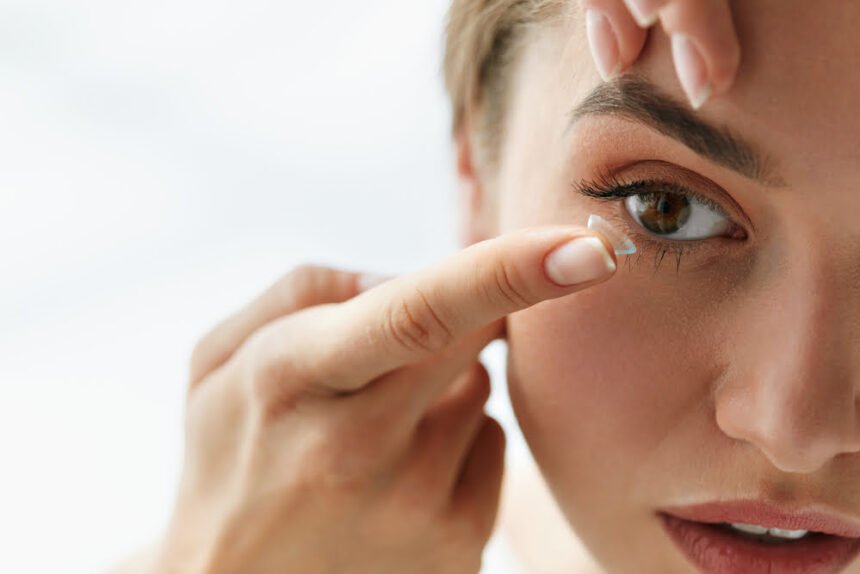Buying contact lenses may seem like an easy process for long-term contact lens wearers. However, it can be an incredibly overwhelming process for first-time buyers. Fear not, though. This guide on buying contact lenses will put your mind at ease and take you through all the essential stages of ordering contact lenses online. This is an important part of eye care.
1. Get an eye exam
Before you buy contact lenses, you should get an eye test. Opticians and Eye Care Professionals recommend for patients/customers to have regular eye exams, usually once a year to make sure that their contact lens prescription is up to date. All contact lenses require a prescription, including cosmetic/non-prescription/coloured lenses and customers/patients must be fitted with contact lenes.
Remember, a contact lens prescription is different from a glasses prescription. Therefore, if you have a prescription for glasses, you can’t use this to buy contact lenses. This is because glasses are positioned further away from your eyes, whereas contact lenses sit directly on the eye. In addition to this, contact lenses have certain specifications which are not part of a glasses prescription.
2. Check your contact lens prescription
You should be given your contact lens prescription at your fitting; however, if you don’t have this at hand, you’ll be sure to find it on the end or side of your contact lens box or on the blister pack containing your lenses.
You’ll need your contact lens prescription when buying contact lenses online. The below details what your prescription should include based on the type of vision correction you require.
For myopia/hyperopia:
- Name
- Date of your prescription
- Contact lens brand name
- Optician’s/ prescriber’s name
- Power/Sphere (PWR/SPH) – Indicates whether you are short sighted or long-sighted. A plus sign (+) indicates long-sightedness, a minus sign (-) indicates short-sightedness.
- Base curve (BC) – this figure indicates the curve of the lens so that it can fit the curvature of your eye; it is usually written in millimetres.
- Diameter (DIA) – the width of the lens, written in millimetres.
Your prescription will have the above no matter what your type of vision correction you require. Additional figures are included on prescriptions for presbyopia and astigmatism.
For astigmatism/toric contact lenses these additional figures will be included:
- Axis – a figure between 0 and 180 determining how much of an angle of correction the lenses offer. Astigmatism requires angular visual correction as those with astigmatism have an unusual curve to their eyeball.
- Cylinder (if you have astigmatism) – indicates the severity of the astigmatism and additional visual requirements
For presbyopia/multifocal contact lenses the additional figures will be included:
- Addition – this is a figure between 0.50 and 3.00 which determes the level of correction required for close distance visually acuity. It is referred to as low, medium, or high.
- Dominant – visual correction is offered through a ‘dominant’ and ‘non-dominant eye’. D and N are figures used to indicate which is which respectively.
3. Stick to the brand prescribed
It’s best to stick to your optician’s advice when it comes to choosing contact lenses. Although, please bear in mind that many high street opticians simply repackage the same contact lenses with their own branding and sell them for more. Fear not; however, you can find your optician equivalents and buy them for less online.
4. Shop around
Prices for contact lenses vary from seller to seller, so make sure that you shop around to ensure that you get the best deal on your contact lenses.
For example, at Feel Good Contacts, you can be sure to find contact lenses for up to 50% cheaper than the high street. In addition to this, their Price Match Guarantee means you’ll be getting your lenses at the lowest prices in the UK. You can order online before 11:59 PM and get the next day delivery.
5. Read the reviews
Before buying contact lenses, take a look at the customer reviews on sites such as Trustpilot or Google. You may also want wish to review their refund policy and delivery service before placing your order. You should only purchase your contact lenses from reputable brands that have been FDA approved.
6. Make sure you have enough contact lenses and supplies
Make sure you always have enough contact lenses and contact lens solution. Eye care is incredibly important, and you don’t want to be panicking if you run out. For convenience, you may wish to use an online retailer with an auto-replenish system. This is a quick and easy way of receiving your contact lenses regularly without having to go online or re-enter your order.

